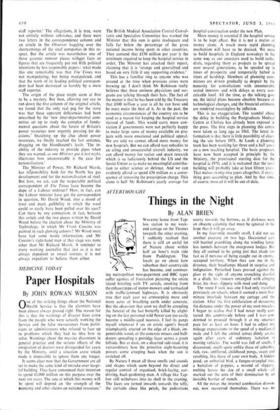THE PRESS
The Power Game
By JOHN WELLS •
THE only publicity a good newspaper needs is provided by the paper itself. So, at least, Sir William Haley put it to Kenneth Harris in a recent interview in the Observer, raising his voice a little perhaps against the growing thunder of commercials for The Times being hammered into a million homes on Independent Television. And certainly the brash, punchy television plugs for the paper—more reminiscent of those advertisements for progressive women's magazines, where we are offered 'In Full Colour —The Conception of a Baby,' than of the staid old status symbol we were once encouraged to tuck under our arms at the railway station— have served only to highlight the sleaziness of this prim old baggage, rejuvenated with monkey- gland and a bright nesir face-lift, wearily flogging herself into a senile frenzy in a last attempt to restore her circulation. We had noted the print- ing of the Moors Murder tape, the hippy, swing- ing, long tough look at the Church of England, even the lush nipples illustrating a sensational piece about the slave trade on the new Women's Page: but May 25 marked a new phase in the symptoms of hysteria.
Occupying a prominent position on the front page there appeared a sensational disclosure by the paper's political correspondent: `Britain Must Buy Steel Gas Pipes Abroad.' Senior Ministers,' we were told, in a disjointed, panting style, 'have just been shocked to find that very large orders for steel pipes will have to be placed abroad before any of the North Sea finds of natural gas can be commercially tapped.' A denial from the steel companies was printed alongside in later editions of the paper, and then the next day the whole article was dismissed as `political kite-flying' in a slightly longer article than the original, prominently printed, and signed by `a `I thought you said the people would always rally behind a great cause.'
staff reporter.' The allegations, it is true, were not entirely without substance, and there were two letters in the correspondence column and an article in the Observer haggling over the shortcomings of the steel companies in this re- spect. But the article was nevertheless one of those gaseous rumour pieces with Rut facts or figures that are frequently put out pith political intentions by less responsible papers: what made this one remarkable was that The Times was not manipulating, but being manipulated, and that the work of its leading political correspon- dent had been destroyed so harshly by a mere staff reporter.
The origin of the piece might seem at first to be a mystery. But then, allowing our eye to run down the first column of the original article, we found that the only real peg for the story was that these apparent deficiencies had been unearthed by the 'new inter-departmental com- mittee set up to study the complex of funda- mental questions about the future of Britain's power resources now urgently pressing for de- cisions.' Snatching up the clue about power resources, we finally reached the last sentence, dragging on the bloodhound's leash. 'The in- ability of the industry to provide pipes when they are wanted, as one Minister put it last night, illustrates how unanswerable is the case for nationalisation.'
The Minister of Power, Mr Richard Marsh, has responsibility both for the North Sea gas development and for the nationalisation of steel. But how, we ask, can the respectable political correspondent of The Times have become the dupe of a Labour minister? How, in fact, can the Labour minister have got the correspondent in question, Mr David Wood, into a mood of trust and meek gullibility in which the wool could so easily have been pulled over his eyes? Can there be any connection, in fact, between this article and the two pieces written by David Wood before the election about the Ministry of Technology, in which Mr Frank Cousins was painted in such glowing colours? Mr Wood must have had some inside information, and Mr Cousins's right-hand man at that stage was none other than Mr Richard Marsh. A reminder to every working journalist that just as it is not always expedient to reveal sources, it is not always expedient to believe them either.



































 Previous page
Previous page